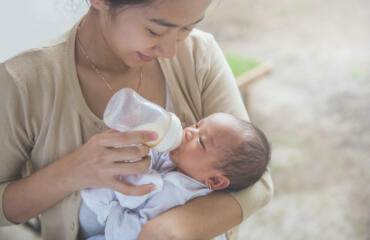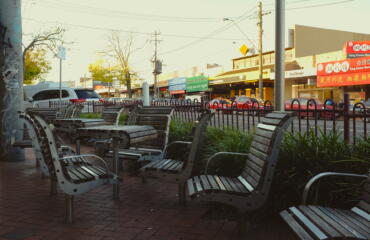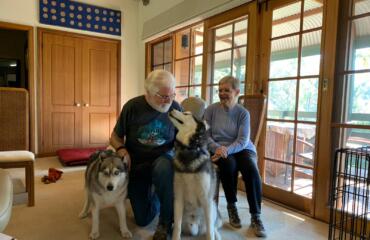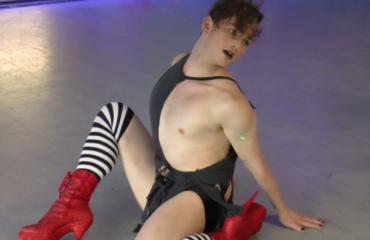Things feel different on Clayton Road. Where a babble of voices usually hangs in the air, there is silence. The typical aroma of Sichuan pepper and fried garlic is gone. Restaurants normally brimming with people slurping laksa or eating xiaolongbao are now eerily quiet. “Everyone is in preventative panic mode” said Vincent Lai.
Preventative panic struck early on Clayton Road. Lai, a regular shopper, put it down to cultural memory. Many Clayton Road locals hail from Asia and have experienced recent pandemics: the H5N1 avian flu detected in Hong Kong in 1997; SARS, which tore out of China in 2002; the H1N1 swine flu in 2009.
In February, as Covid-19 began to build in Australia, Lai says Clayton locals remembered these past pandemics and understood the risks the virus posed. Shoppers donned masks and gloves as the community braced themselves for what they suspected was coming.
For many Clayton Road locals, preventive panic took the form of stockpiling; shelves were emptied of toilet paper and rice; and hand sanitiser became a precious commodity. “When the panic buying started when that … first emergency round of toilet paper happened, everyone kind of freaked out.”
STILL CANT get toilet paper anywhere in Clayton due to buyers going store to store and wiping weekly delivers. #Melbourne #covid-19 https://t.co/Ga69Bi7PDj
— Angela Korras (@AngelaKorras) March 29, 2020
Francois Joubert has been observing the panic close- up. The Clayton-based psychologist says that seeing supermarket shelves stripped of supplies has triggered old memories for one or two of his clients who had immigrated to Australia from war-torn countries. Joubert says one had flashbacks to the trauma they experienced of food shortages in Serbia during the Balkan Wars in the 1990s.
He says he has seen an increase in patients coming to the clinic with anxiety and depression. These days, he is booked out up to three weeks in advance, where normally it is closer to one.
The panic is not unique to Clayton. Nor is stockpiling – Australians made international headlines in early March with their frantic (and counter-productive) rush to stock up on toilet paper after the country’s first reported coronavirus death. Dr Dougal Sutherland, Clinical Psychologist at Victoria University of Wellington and Umbrella Health says stockpiling is a way of controlling anxiety. “Anxiety is about being out of control. It gives you some sense of certainty where you feel you can control something. Part of buying toilet paper might have been people thinking, at least we’ve got that sorted.”
Lai is a designer, originally from Hong Kong. He has been working from home since the pandemic hit and has experienced the ups and downs that come with a drastic change in routine.
In March, supermarkets limited the number of essential items per customer, and social distancing rules were introduced, easing the panic on the shopping strip. But a sense of fear and urgency persisted – pervasive but difficult to put your finger on. Lai describes it as a “frenetic energy”. People scurry from shop to shop, gaze down, shoulders hunched, solely focused on their errands.
Before the crisis, locals would browse, window shop, take their time. Now, he says, “They’re doing the things that they need to and then getting the f–k out.”

Clayton psychologist Francois Joubert has noticed an increase in patients coming to his clinic with anxiety and depression since early March. Photo: supplied.
This isn’t necessarily a bad thing. In these times, Dr Sutherland says a small dose of panic may be beneficial. Despite the obvious stress of feeling panicked – racing heart, tight chest, shorter breaths, butterflies in the stomach – he says these responses help maintain social distancing in society. “We do want people to be on guard, we want them to be alert, because that will activate things, making sure that we keep social distancing. Because we see people and think, well I could get sick from them. So, I will steer a little bit clear.”
But not everyone appears to be taking social distancing as seriously as hoped. A while back, Lai was standing in the line at Hong Kong supermarket, donned in mask and gloves, when a man shouldered him as he walked past, ignoring the one-and-a-half to two-metre distance rule now dictated by state and federal governments. (“And by the way,” says Lai, “there was lot of space around me.”)
Similarly, while walking along Clayton Road, he watched a woman approach a pair of younger women and tap one of them on the back before asking them for directions. She then stood very close them as she talked.
“I’m like, the whole point is that you’re not supposed to make any contact, and they’re going out of the way to make contact,” says Lai. “So, I think they care on the surface. But I don’t think they really understand the severity.”
He believes this is also evidence of cultural memory coming in to play. Lai says he has noticed that long-term Australian residents don’t always seem to have the same level of fear or comprehension of the risk posed by Covid-19 as do some newer arrivals.
“I think the Asian immigrants are more cautious because they’ve seen what it can do.”
This is not to say that Australians without previous experience of a pandemic are not stressed; but that their reactions have not been shaped by prior knowledge. Francois Joubert says that for many, these experiences – be it walking empty supermarket aisles, being compelled to remain at a physical distance from others, or having to run your restaurant as take-out only – constitute a first of its kind trauma.
Despite Australia’s generally effective response to the Covid-19 threat, the anxiety people are feeling in these unprecedented times remains potent. With the recent disturbing increases in community transmission in Victoria – and the reimposition of lockdown laws in a growing number of suburbs, plus the introduction of “hard lockdowns” in some high-rise towers – the sense of panic, and potential for trauma, are very real.




